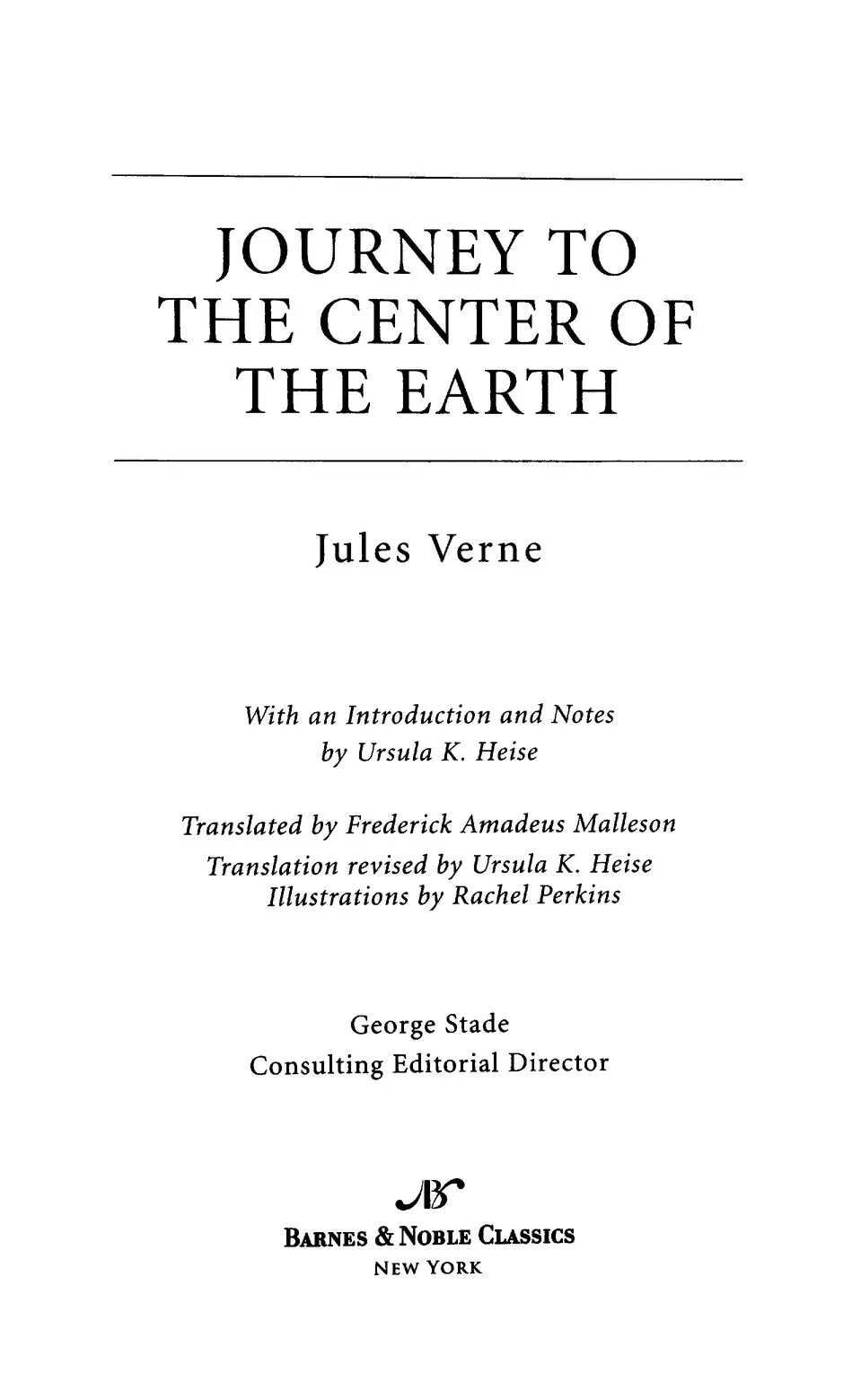Journey to the Center of the Earth (Barnes & Noble Classics Series)

Table of Contents
From the Pages of Journey to the Center of the Earth
Title Page
Copyright Page
Jules Verne
The World of Jules Verne and Journey to the Center of the Earth
Introduction
Acknowledgements
A Note on the Translation
A Note on Measurements
I
II
III
IV
V
VI
VII
VIII
IX
X
XI
XII
XIII
XIV
XV
XVI
XVII
XVIII
XIX
XX
XXI
XXII
XXIII
XXIV
XXV
XXVI
XXVII
XXVIII
XXIX
XXX
XXXI
XXXII
XXXIII
XXXIV
XXXV
XXXVI
XXXVII
XXXVIII
XXXIX
XL
XLI
XLII
XLIII
XLIV
XLV
Endnotes
Inspired by Journey to the Center of the Earth
Comments & Questions
For Further Reading
From the Pages of
Journey to the Center of the Earth
Otto Lidenbrock had no mischief in him, I readily admit that; but unless he changes in unlikely ways, he will die a confirmed original. (page 3)
My uncle went on working, his imagination went off rambling into the ideal world of combinations; he lived far away from earth, and genuinely beyond earthly needs. (page 26)
“All the theories of science demonstrate that such a feat is impossible!” (page 32)
Large though it is, that asylum is not big enough to contain all Professor Lidenbrock’s madness! (page 44)
We traveled around the enormous base of the volcano. The professor hardly took his eyes off it; he gesticulated, he seemed to challenge it and say: “Here’s the giant that I’ll tame!” (page 76)
The crater of Snaefells resembled an inverted cone, whose opening might have been half a league in diameter. Its depth appeared to be about two thousand feet. Imagine the aspect of such a container when it filled with thunder and flames. The bottom of the funnel was about 250 feet in circumference, so that its rather gentle slopes allowed its lower brim to be reached without difficulty. Involuntarily I compared the whole crater to an enormous hollow grenade launcher, and the comparison frightened me. (page 89)
My hair stood on end with terror. The feeling of emptiness overcame me. I felt the center of gravity shifting in me, and vertigo rising up to my brain like drunkenness. There is nothing more treacherous than this attraction toward the abyss. (page 94)
“To Hell with your calculations!” replied my uncle in a fit of rage. “To Hell with your hypotheses!” (page 131)
If the ‘average’ number of difficulties did not increase, we could not fail to reach our goal. And then, what glory! I had come around to reasoning in this way, quite like a Lidenbrock. Seriously. Was this due to the strange environment in which I was living? Perhaps. (page 133)
Impossible to get away. The reptiles approach; they wheel around our little raft at a speed that express trains could not match; they swim concentric circles around it. I’ve gripped my rifle. But what can a bullet do against the scales that cover the bodies of these animals? (page 168)
Ah! the descent of this electric sphere has magnetized all the iron on board; the instruments, the tools, the weapons, move about and clash with a sharp jangle; the nails in my shoes cling tenaciously to a plate of iron set into the wood. I cannot pull my foot away! (pages 180-181)
“As long as the heart beats, as long as the flesh pulsates, I can’t admit that any creature endowed with willpower needs to be overwhelmed by despair.” (page 215)
Ah! What a journey! What a wonderful journey! Having entered through one volcano, we had exited through another, and that other one was more than twelve hundred leagues away from Snaefells, and from that barren landscape of Iceland at the edge of the world! (pages 228-229)
From that day on, the professor was the happiest of scholars, and I was the happiest of men, for my pretty Virland girl, resigning her place as ward, took up position in the house on the Königstrasse in the double capacity of niece and wife. No need to add that her uncle was the illustrious Otto Lidenbrock, corresponding member of all the scientific, geographical, and mineralogical societies on the five continents of the earth. (page 232)


Published by Barnes & Noble Books
122 Fifth Avenue
New York, NY 10011
www.BookishMall.com.com/classics
Le Voyage au centre de la Terre was first published in 1864. Frederick Amadeus
Malleson’s English translation (1877) has been thoroughly revised by
Ursula K. Heise for this edition of Journey to the Center of the Earth.
Published in 2005 by Barnes & Noble Classics with new Biography, Chronology,
Introduction, A Note on the Translation, A Note on Measurements, Notes,
Comments & Questions, and For Further Reading.
Introduction, A Note on the Translation, A Note on Measurements, Notes, and For Further Reading
Copyright © 2005 by Ursula K. Heise.
Translation revisions, Note on Jules Verne, The World of Jules Verne and
Journey to the Center of the Earth, Inspired by Journey to the
Center of the Earth, Comments & Questions, and Illustrations by Rachel Perkins
Copyright © 2005 by Barnes & Noble, Inc.
All rights reserved. No part of this publication may be reproduced or
transmitted in any form or by any means, electronic or mechanical, including
photocopy, recording, or any information storage and retrieval system,
without the prior written permission of the publisher.
Barnes & Noble Classics and the Barnes & Noble Classics
colophon are trademarks of Barnes & Noble, Inc.
Journey to the Center of the Earth
ISBN-10: 1-59308-252-5 ISBN-13: 978-1-59308-252-9
eISBN : 978-1-411-43244-4
LC Control Number 2005923983
Produced and published in conjunction with:
Fine Creative Media, Inc.
322 Eighth Avenue
New York, NY 10001
Michael J. Fine, President and Publisher
Printed in the United States of America
QM
1 3 5 7 9 10 8 6 4 2
Jules Verne
The creator of the roman scientifique, the popular literary genre known today as science fiction, Jules Gabriel Verne was born in the port town of Nantes, France, in 1828.
1 comment